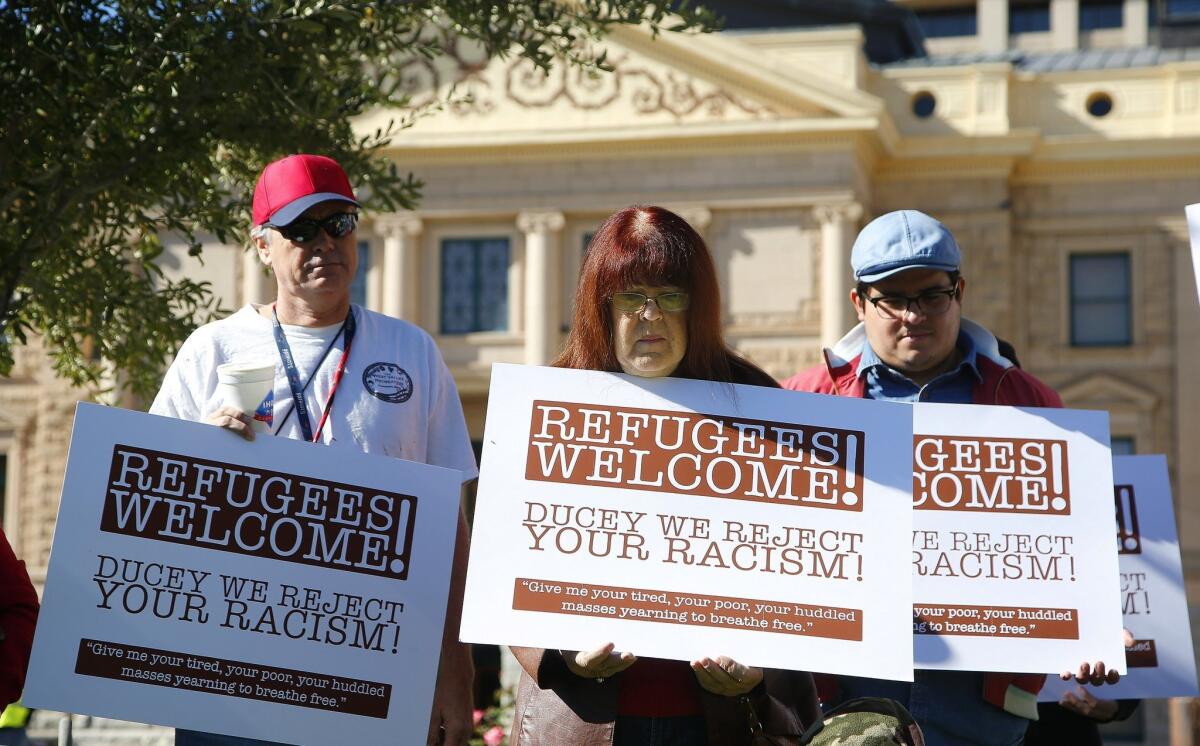Column: Overheated rhetoric won’t solve the Syrian refugee issue

Demonstrators in favor of welcoming Syrian refugees attend a rally in Phoenix, Ariz. on Nov. 17. Arizona Gov. Doug Ducey has joined a growing number of governors calling for an immediate halt to the placement of any new refugees in the wake of terrorist attacks in Paris.
- Share via
Judging from some of the more extreme rhetoric on the presidential campaign trail, the biggest threat to U.S. national security today comes from frightened Syrian families fleeing the brutality of Islamic State.
“Given the tragedy in Paris last Friday, the U.S. simply cannot, should not and must not accept any Syrian refugees,” Ben Carson wrote this week.
Ted Cruz said he’d admit only Christian refugees. “The idea that we should bring tens of thousands of Syrian Muslim refugees to America? It is nothing less than lunacy,” he said. “On the other hand, Christians who are being targeted … we should be providing safe haven to them.”
Maybe, while remaining vigilant, we can also calm down and take a deep breath.
Chris Christie, burnishing his credentials as a tough guy, said he wouldn’t trust toddlers from that part of the world. “I don’t think orphans under 5 … should be admitted into the United States at this point,” he told interviewer Hugh Hewitt.
Meanwhile, at least 27 governors, all but one Republican, have declared that they will try to block refugees from settling in their states, even though they don’t legally have the power to do so.
It’s perfectly reasonable for Americans to worry that terrorists might try to enter the United States by passing themselves off as refugees. That was apparently the case with one of the attackers in Paris, who was carrying a fake Syrian passport — which means he might not have been a Syrian at all. But that’s an argumen for tougher vetting of refugee applicants, not for rejecting all refugees, worthy and unworthy alike.
The vast majority of people fleeing Syria aren’t sympathetic to Islamic State; they’re fleeing because they fear the jihadists. As Cruz suggested, Christians, who made up about 10% of Syria’s population in 2011, have indeed been targeted for special persecution. But so have Kurds, Alawites, Shiite Muslims,
Yazidis and Sunni Muslims who oppose Islamic State. Should we turn our backs on those persecuted groups because they follow a different faith from most Americans?
The worst thing about Cruz’s proposal was that it reinforced one of Islamic State’s favorite narratives: the notion of a “clash of civilizations” pitting the West against Islam. That proposition asks decent Muslims to choose one side or the other: their faith, or Christianity. If we’re waging a war of ideas in the Muslim world, Cruz just shot us in the foot.
This week’s soundbites were “really bad,” said Danielle Pletka, a foreign policy scholar at the conservative American Enterprise Institute. “This was a moment in which people running for office collectively lost their grip on their own principles. There are lots of ways to express legitimate concern about possible security threats from refugees, but they found the worst possible way to do it.
“It’s the Trump effect,” she added — a race to the bottom by candidates seeking to emulate the crowd-pleasing anger of Donald Trump.
“In defense of the indefensible,” she said, “you can criticize those Republicans for a lack of compassion, but how do you defend an administration that has left millions of Syrians vulnerable to the depredations of ISIS?”
There are legitimate issues here, but the roar of the campaign has drowned them out.
How many Syrian refugees should the United States accept? This year, we’ve admitted about 1,800. President Obama has proposed raising that number to 10,000 next year. Meanwhile, Germany is housing hundreds of thousands of asylum seekers, and has formally admitted more than 57,000 Syrians as refugees this year.
And how rigorously should would-be refugees be vetted? To listen to the candidates, you might think the feckless Obama administration isn’t screening them at all. But the Homeland Security Department puts applicants through a process that takes more than 18 months, on average. More than half of those admitted have been children. Only 2% have been single men of military age.
And of the 1,800-plus Syrians admitted so far, none has been linked to a terrorist incident in the United States.
So maybe, while remaining vigilant, we can also calm down and take a deep breath.
That appeared to be happening Tuesday, as a few Republicans showed signs of sensible leadership.
“The answer to this is not to ban people from coming,” Jeb Bush told Bloomberg Politics. “The answer is to lead — to resolve the problem in Syria.”
House Speaker Paul D. Ryan (R-Wis.) called for a “pause” in admitting Syrian refugees but indicated that he didn’t mean a permanent ban.
“It’s important that we have a refugee system in place. We respect that,” he said. “But we think it’s simply prudent … that we be better guarded against any possible infiltration.”
There’s a challenge there for the rest of the GOP. Will other candidates now attack Bush and Ryan as soft on refugees? Or will they agree that refugees aren’t the main threat to our security — and don’t deserve to be punished for the crimes of their oppressors?
Twitter: @doylemcmanus
Follow the Opinion section on Twitter @latimesopinion and Facebook
More to Read
A cure for the common opinion
Get thought-provoking perspectives with our weekly newsletter.
You may occasionally receive promotional content from the Los Angeles Times.











